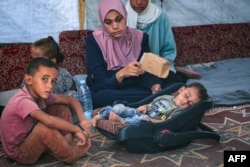More than two dozen international aid groups warned Tuesday that the humanitarian response in the Gaza Strip is at risk of “imminent collapse” due to Israel’s continued operational restrictions and the shrinking of its so-called safe zone for Palestinian civilians.
“Humanitarian efforts in Gaza are stretched to the breaking point, leaving thousands without basic services,” Camilla Dogliotti, Humanity & Inclusion/Handicap International’s Palestine country manager, said in a statement.
“No place is safe, as people live in constant fear of forced evacuations and new attacks,” she said. “We must protect the so-called humanitarian zones and ensure the safety of aid workers so they can continue to provide essential relief to those in desperate need.”
Several international aid agencies, including Save the Children, Mercy Corps, the Norwegian Refugee Council, Oxfam, Project HOPE and War Child, said they have seen staff members displaced, warehouses put out of reach and aid operations interrupted by the latest round of Israeli evacuation orders issued Sunday.
The United Nations also reported on Monday that its humanitarian operations had been mostly halted as it had just hours to move the command center for its operations.
On Sunday, the Israel Defense Forces issued new evacuation orders for parts of Deir al-Balah in central Gaza. According to the United Nations, it was the 16th such evacuation order this month.
The U.N. and several other aid agencies had moved their operational command centers to Deir al-Balah in May, after Israeli orders to evacuate Rafah in southern Gaza.
Israel’s military says the evacuations are necessary as it continues its operations to eliminate Hamas militants in parts of Gaza.
The group of aid agencies said Tuesday that the repeated evacuation orders have displaced more than 260,000 civilians and severely disrupted their access to aid.
“Israel is demanding civilians move into even smaller areas of Gaza which offer them no safety from the conflict, and this is coupled with other escalating restrictions,” Lilu Thapa, regional director for the Danish Refugee Council, said in a statement. “If this continues on its current trajectory, it will severely impede aid operations to the point where delivering essential aid to civilians in Gaza will become impossible.”
The U.N. estimates that about 86% of Gaza is under Israeli evacuation orders, pushing more than 2 million people into a small, overcrowded area with few basic services.
Gilles Michaud, U.N. undersecretary-general for safety and security, said Tuesday that the organization is “operating at the upper-most peripheries of tolerable risk.”
“This weekend the IDF gave just a few hours’ notice to move more than 200 U.N. personnel out of their offices and living places in Deir al-Balah, a crucial humanitarian hub,” he said in a statement. “Like most Palestinians in Gaza, we are running out of safe spaces for our own staff.”
A U.N. official, who spoke on the condition of anonymity because of the sensitivity of the situation, said Monday that with the short notice to move, some staff were forced to sleep in a warehouse. Vital equipment was left behind. The official said the U.N. is looking for a safe place where it can reset its operations.
The evacuations also jeopardize the launch of a massive polio vaccination campaign this Saturday.
The virus was detected last month in environmental samples from Khan Younis and Deir al-Balah, and at least one case has been confirmed in a 10-month-old baby — the first case in Gaza in 25 years.
More than 1,000 medical workers and volunteers are aiming to reach 640,000 children under age 10 in Gaza with double doses of the vaccine over a two-week period.



